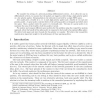Free Online Productivity Tools
i2Speak
i2Symbol
i2OCR
iTex2Img
iWeb2Print
iWeb2Shot
i2Type
iPdf2Split
iPdf2Merge
i2Bopomofo
i2Arabic
i2Style
i2Image
i2PDF
iLatex2Rtf
Sci2ools
100
click to vote
INFOCOM
2000
IEEE
2000
IEEE
Competitive Queue Policies for Differentiated Services
We consider the setting of a network providing differentiated services. As is often the case in differentiated services, we assume that the packets are tagged as either being a high priority packet or a low priority packet. Outgoing links in the network are serviced by a single FIFO queue. Our model gives a benefit of 1 to each high priority packet and a benefit of 1 to each low priority packet. A queue policy controls which of the arriving packets are dropped and which enter the queue. Once a packet enters the queue it is eventually sent. The aim of a queue policy is to maximize the sum of the benefits of all the packets it sends. We analyze and compare different queue policies for this problem using the competitive analysis approach, where the benefit of the online policy is compared to the benefit of an optimal offline policy. We derive both upper and lower bounds for the policies we consider. We believe that competitive analysis gives important insight to the performance of thes...
Related Content
| Added | 25 Aug 2010 |
| Updated | 25 Aug 2010 |
| Type | Conference |
| Year | 2000 |
| Where | INFOCOM |
| Authors | William Aiello, Yishay Mansour, S. Rajagopolan, Adi Rosén |
Comments (0)

